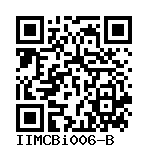M-T2
IIMCBi006-B
General
Cell Line |
|
| hPSCreg name | IIMCBi006-B |
| Cite as: | IIMCBi006-B (RRID:CVCL_C9D5) |
| Alternative name(s) |
M-T2
|
| Cell line type | Human induced pluripotent stem cell (hiPSC) |
| Similar lines |
RCi004-A-1 (RCi004-A + HTT GC #H34-32_T34-23) Donor's gene variants: HTT Donor diseases: Huntington disease |
| Last update | 7th August 2023 |
| User feedback | |
Provider |
|
| Generator | International Institute of Molecular and Cell Biology in Warsaw (IIMCB) |
External Databases |
|
| BioSamples | SAMEA114240762 |
| Cellosaurus | CVCL_C9D5 |
| Wikidata | Q123032669 |
General Information |
|
| Publications | |
| * Is the cell line readily obtainable for third parties? |
No |
Donor Information
General Donor Information |
|
| Sex | female |
Phenotype and Disease related information (Donor) |
|
| Diseases | A disease was diagnosed.
|
Donor Relations |
|
| Other cell lines of this donor | |
External Databases (Donor) |
|
| BioSamples | SAMEA111377771 |
Ethics
| Has informed consent been obtained from the donor of the embryo/tissue from which the pluripotent stem cells have been derived? | Yes |
| Was the consent voluntarily given? | Yes |
| Has the donor been informed that participation will not directly influence their personal treatment? | Yes |
| Can you provide us with a copy of the Donor Information Sheet provided to the donor? | Yes |
| Do you (Depositor/Provider) hold the original Donor Consent Form? | No |
| If you do not hold the Donor Consent Form, do you know who does? | Yes |
| Please indicate whether the data associated with the donated material has been pseudonymised or anonymised. | anonymised |
| Does consent explicitly allow the derivation of pluripotent stem cells? | Yes |
| Does consent prevent CELLS DERIVED FROM THE DONATED BIOSAMPLE from being made available to researchers anywhere in the world? | No |
| How may genetic information associated with the cell line be accessed? | Controlled Access |
| Will the donor expect to receive financial benefit, beyond reasonable expenses, in return for donating the biosample? | No |
| Has a favourable opinion been obtained from a research ethics committee, or other ethics review panel, in relation to the Research Protocol including the consent provisions? | Yes |
| Name of accrediting authority involved? | Ethics Committee of the General University Hospital, Prague |
| Approval number | decision no. 1773119 S-tV from 17.10.2019 |
| Do you have obligations to third parties in regard to the use of the cell line? | Yes |
| Please describe: | Restricted to research into Huntington's Disease, project “Opus” grant no. 2019/33/B/NZ3/02889 to MCz and further projects |
| For generation of the cell line, who was the supplier of any recombined DNA vectors or commercial kits used? |
hIPSC Derivation
General |
|
| Source cell type (free text) | fibroblast |
Reprogramming method |
|
| Vector type | Integrating |
| Vector | Virus (Lentivirus) |
| Is the used vector excisable? |
Unknown |
| Absence of reprogramming vector(s)? |
Yes |
| Reprogramming vectors silenced? |
Yes |
| Methods used |
Immunostaining, PCR
|
| Notes on reprogramming vector silencing | EF1α-STEMCCA-LoxP (OKSM) |
Vector free reprogramming |
|
Other |
|
| Derived under xeno-free conditions |
Unknown |
| Derived under GMP? |
Unknown |
| Available as clinical grade? |
Unknown |
Culture Conditions
| Surface coating | Matrigel/Geltrex |
| Medium |
Essential 8™
|
| Has Rock inhibitor (Y27632) been used at passage previously with this cell line? | Yes |
| Has Rock inhibitor (Y27632) been used at cryo previously with this cell line? | Yes |
| Has Rock inhibitor (Y27632) been used at thaw previously with this cell line? | No |
Characterisation
Analysis of Undifferentiated Cells
| Marker | Expressed | Immunostaining | RT-PCR | Flow Cytometry | Enzymatic Assay | Expression Profiles |
| POU5F1 (OCT-4) |
Yes |
|
|
|||
| SSEA-4 |
Yes |
|
||||
| NANOG |
Yes |
|
|
|||
| SOX2 |
Yes |
|
|
|||
| TRA 1-60 |
Yes |
|
Differentiation Potency
Genotyping
Karyotyping (Cell Line) |
|
| Has the cell line karyotype been analysed? |
Yes
46, XX
Passage number: 10
Karyotyping method:
G-Banding
|
Other Genotyping (Cell Line) |
|


Login to share your feedback, experiences or results with the research community.